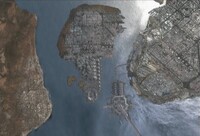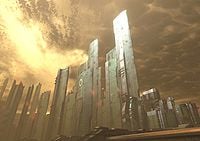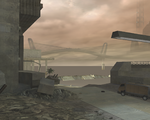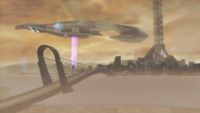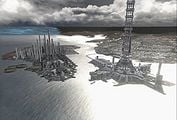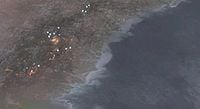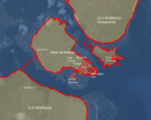Mombasa
From Halopedia, the Halo wiki
Template:City Mombasa is a city in Kenya, East African Protectorate on the planet Earth. It consisted of a prosperous section called New Mombasa on an island known as Mombasa Island, as well as a run down section known as Old Mombasa, on the mainland around the island.[1]
Mombasa Island, where the metropolis of New Mombasa lies, is separated from the mainland by two creeks: Tudor Creek to the north and Kilindini Harbour to the south. Northwest of the island and between the creeks, there is a large peninsula, connected to the Mombasa island by the Makupa Causeway. The effects of the dramatic climbing of sea levels due to global warming are evident throughout Mombasa. Large areas of former land are now underwater; most of the Mombasa has been saved only by large seawalls around the shores.
History
The exact founding date of the city is unknown, but it has a long history. It must have been already a prosperous trading town in the 12th century, as one of its earliest mentions is from 1151. Mombasa had always been an important port of the Indian Ocean trade routes and was captured and recaptured countless times by a variety of powers including Portugal, the United Kingdom, and various Arab forces. This violent history led to its Swahili nickname "Kisiwa Cha Mvita", or "Island of War". The city became part of the independent nation of Kenya in the 20th century. During this era, Mombasa became a tourist destination, boasting numerous resorts and clean white beaches. It was also important as a port city, connecting East Africa to the Indian Ocean.[2]
The mainland districts were stifled, ironically, by their thirst for growth. During the 21st and 22nd centuries, sea levels worldwide began rising due to global warming. Port cities around the planet were faced with a choice: construct flood control measures, or drown. In Mombasa, it was decided that, rather than shore up the old docks on Mombasa Island, it would be easier to build brand new ports on the mainland, southwest of the city. So massive seawalls were built to hold back the rising waters, and new dock structures extended out into Kilindini Harbour.
Interstellar Era
For a time, these docks brought prosperity to the mainland. Shantytowns were demolished to make way for new office buildings, highways were constructed, and commerce thrived. But by the end of the 23rd century, global warming began to reverse as new technologies emerged and millions of people departed Earth for colonies in the rest of the Solar System. Sea levels began receding as temperatures dropped worldwide. In time, the port facilities on the mainland were left literally high and dry.
Mombasa underwent dramatic change with the arrival of the interstellar era. In response to increasing demand for cheap orbital access, due to its economic stability and prominent location, Mombasa was chosen to be Earth's first space elevator city. The government began construction on one of the wonders of the age: a space elevator (Mombasa's proximity to the equator made it an ideal location) in 2302. This structure served to lift heavy cargo into geosynchronous orbit without expensive booster rockets filled with fuel. The elevator, known as the Mombasa Tether, transformed the city; Mombasa became one of the most important cities on Earth. Consequently, the island-city transformed into the hi-tech metropolis of New Mombasa, while the mainland area languished, closed off behind its useless seawall.
Over the next eleven years the city experienced explosive growth, but nothing compared to what followed. The city grew out as well as up, its urban sprawl unequaled throughout the continent. There was an immediate influx of trade, people, and jobs; as a result, the landscape of the city was completely re-imagined. Within a century, the old apartment buildings and hotels on Mombasa Island had been torn down and replaced with the latest architecture, such as vast industrial complexes and gleaming office towers. It was during this period of tremendous growth that the city became known as "New Mombasa".
Mombasa would change dramatically within the centuries that followed. By 2430, New Mombasa had absorbed the entire island and many of the surrounding towns, which became overrun by residents of Mombasa. The switch of name was never official, and though many of the neighborhoods within direct line of sight to the Mombasa Tether still distributed newspapers and chatter directories under their previous names, all municipalities within a 74 km radius of the island became referred to as "Old Mombasa".[1]
Covenant invasion
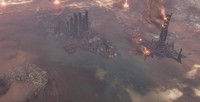
- Main article: Battle of Mombasa
On October 20, 2552, a small group of Covenant capital ships arrived at Earth. Uninformed of the human presence on Earth, Regret was outnumbered and outgunned against the UNSC Home Fleet. During the orbital battle, the Prophet of Regret's flagship, Solemn Penance, broke through Earth's defenses and descended to the atmosphere, and anchored itself above New Mombasa.[3] The Covenant started deploying their ground forces to the city, in search of a Forerunner relic, the Ark Portal, buried under the city.[4]
However, due to a strong UNSC counterattack and the inferior numbers of the Covenant, Regret ordered all of his forces to be evacuated back into the Carrier. After this, the ship jumped into slipspace just above the city, releasing a shockwave and pulling multiple city blocks from the mainland with it. This event became known as the "Mombasa Slipspace event". In the hours after Regret's retreat, a larger Covenant fleet arrived at Earth. After sending in ground forces and crushing the remaining UNSC resistance in the city, they glassed the area in order to uncover the Portal.[5] During the final days of the Battle for Earth, only smoldering ruins of Mombasa remained.[6]
Old Mombasa
- Main article: Old Mombasa
The mainland area of Mombasa was known as Old Mombasa. By 2552, it had remained much the same as the preceding centuries. Its architecture was an odd hodgepodge of old and new: 16th-century Muslim arcades, aging 21st-century office buildings, looming 26th-century power couplings, old concrete homes secured with computerized locks. Clotheslines strung next to power lines, and mechanical gates set into ancient brick walls. The culture also seems displaced; while New Mombasa was populated with industrial workers and ambitious cosmopolitans, Old Mombasa was considered to be more of an old rundown slum that deteriorates by the day. The denizens of the old city were largely isolated from the residents of New Mombasa; even their dialect was completely different from the standard language.[3][4]
New Mombasa
- Main article: New Mombasa
The futuristic metropolis of New Mombasa resided on the Mombasa island, connected to the mainland by multiple bridges. By the 26th century the city was a dynamic, cosmopolitan metropolis, boasting such amenities as an Urban Infrastructure AI, mile-long suspension bridge, a highly efficient MagLev train system, an automatic highway network, a large police department, and large-scale recreational areas.
While the majority of New Mombasa has been divided to numbered sectors, some districts such as Mbaraki, Kizingo or Kikowani still retain their original names. The original names are often seen in the names of streets or train stations, for example. Some of the districts' names have changed, albeit slightly; areas originally referred to as Tangana and Liwatoni are now referred to as Tanaga and Liwitoni, respectively. The locations of some districts have changed as well. This is the case with most of the districts on the southern side of the island, where the sea has claimed large areas of land.[3][5]
Locations
|
|
Trivia
- Curiously, the large peninsula northwest of the Mombasa island is absent in the city's map geometry from the Halo 3: ODST level Prepare To Drop, while the general outline of the Mombasa shoreline remains fairly similar to its modern-day counterpart. This may be simply because the area was never intended to be seen in the game and would thus be nonessential to include. Another explanation for the absence would be the possible creation of an artificial waterway, or a wide canal leading deep inland. This theory is supported by the presence of extensive docking facilities in the industrial town of Voi, well over a hundred kilometers inland from the city. Such canal would provide easy access for ships to ferry massive amounts of cargo in and out of Voi, all the way to Mombasa's space tether and other locations around Earth.
Gallery
- Mombasa today.png
A satellite view of Mombasa during the 21st century.
- 1225615107 Mombasabridge.JPG
The Mombasa suspension bridge, shown to scale on Google Earth.
List of appearances
- Images of Mombasa
- Halo 2 (First appearance)
- Halo 3
- Halo 3: ODST
- Halo: Ghosts of Onyx (Mentioned only)
- Halo Graphic Novel
- i love bees (Mentioned only)
